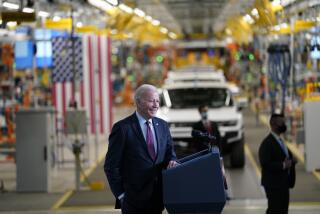‘The powers of the earth’
Democratic states are usually depicted on political maps using the color blue, but a more logical choice would be green. On environmental issues, the Democratic presidential candidates behave not so much as individuals as they do a bloc; though they have subtle ideological differences, most are in lock step in their views on fighting global warming or reducing pollution. All are basically in accordance with the green orthodoxy preached by organizations such as the Sierra Club, the Union of Concerned Scientists or Environmental Defense. As for the Republicans ... not so much.
The GOP candidates are neither as green nor as unified as the Democrats. In part, this reflects a split in the evangelical Christian community. Though the Christian right has set positions on many major political issues, it is deeply conflicted on the environment because the Bible gives no clear guidance on it -- both sides quote contradictory Scripture passages on mankind’s obligations to conserve the Earth and its creatures. Hence, the most evangelically correct major candidate, Mike Huckabee, is a lukewarm greenie who supports capping carbon emissions to slow global warming but gives few specifics on how to do it. And then there’s John McCain, who not only wrote a bill to cap carbon but has a video on his campaign website in which he criticizes the GOP for losing its way on environmentalism since Republican President Teddy Roosevelt founded the conservationist movement.
But McCain and Huckabee are exceptions to the general rule, which is that Republican candidates seldom talk about the environment, a topic that does not resonate with the party’s base. What Republicans like to discuss is “energy security,” by which they mean reducing the country’s reliance on foreign oil (and lowering gas prices). The main solution to this problem from Mitt Romney is to turn coal into a liquid fuel -- which would indeed promote energy independence, but at a ruinous cost to the environment, because producing and burning liquid coal emits twice as much greenhouse gases as gasoline. Rudolph W. Giuliani is also a big believer in alternative fuels and has suggested that the U.S. take on global warming with a research drive comparable to the Apollo moon program, yet he rejects mandatory limits on emissions.
Here are some of our favored solutions to the key environmental issues of the day, and where the candidates stand on them:
* Climate change. The best way to slow the progress of global warming is simply to impose a price on polluters by taxing carbon emissions. One candidate, Christopher J. Dodd, has broached the idea of corporate carbon taxes, but he has given few specifics on his plan. The rest of the Democrats, along with Huckabee and McCain on the Republican side, favor a cap-and-trade system in which the government caps carbon emissions and polluters get carbon credits to trade among themselves. Cap-and-trade systems are complex and easy to cheat or manipulate, and would probably raise energy prices as much as carbon taxes. But it’s a solution that could work if properly structured, and it beats doing nothing at all.
* Energy. Congress should mandate that the nation get at least 20% of its electricity from renewable sources such as wind, solar, tidal or geothermal by 2020. Every Democratic candidate supports this concept; Bill Richardson out-greens the others witha 30% goal. Few Republicans concur, though Huckabee favors 15% by 2020. Giuliani has recently touted more renewable and nuclear power, but he offers no specifics.
The nation also needs to become more energy-efficient, with stricter standards for buildings and appliances and tighter fuel-economy standards. Again, the Democrats all agree -- and Richardson is once again out front with a well-meaning if unrealistic proposal to mandate a fleetwide fuel economy average of 50 miles per gallon by 2020. Few Republicans other than Huckabee and McCain have addressed the issue in any detail, and most appear to favor current standards.
On biofuels, Congress should stop imposing mandates to increase production of renewable fuels until more environmentally responsible alternatives are available. The mania for corn-based ethanol is raising food prices, polluting waterways and threatening farmlands set aside for conservation. Unfortunately, nearly all the candidates from both parties -- including onetime ethanol skeptics McCain and, on the Democratic side, Hillary Rodham Clinton -- are calling for more ethanol, in large part because they hope to win the caucuses in corn-growing Iowa. Clinton and fellow Democrat Barack Obama also display a disturbing openness to liquid coal, tarnishing their otherwise sterling green credentials.
* Resources. When Congress enacted the General Mining Act of 1872, giving miners free access to public lands was considered a great way to settle the West. The West is now pretty well settled, but the same outdated law still allows hard-rock mining companies to extract minerals, and pollute the landscape, without paying any royalties to the government that could in turn be used to pay forcleanup. The result: Mining accounts for more Superfund sites than any other industry, and taxpayers are stuck footing much of the bill. In a survey conducted by the League of Conservation Voters, all the Democratic candidates favored reforming this law. McCain, the only Republican candidate to respond, says he backs reforms to make mining more environmentally friendly.
The Democrats also would restore elements of the Clean Air Act and Clean Water Act that have been eroded by the Bush administration, and they would forbid drilling for oil in the Arctic National Wildlife Refuge. Other than McCain, most of the GOP candidates are for more domestic oil drilling, including in the refuge.
Environmentalism is an American value that we’ve been making up as we go along. The concept didn’t exist when the Constitution was framed, and for most of our history, this country’s rich natural resources gave us a sense of life without limits. But that admirably expansive spirit has left us with some bad habits, from political isolationism to the SUV. We now know that exploiting the earth’s abundancecomes with a cost, and not just to a few endangered species. Our response in the next few years, including our vote for president, will help determine humanity’s fate for decades, maybe centuries, afterward.
Next: “Domestic Tranquillity” explores poverty and infrastructure. The complete “American Values” series and an explanation of it can be found at latimes.com/values08.
More to Read
Start your day right
Sign up for Essential California for news, features and recommendations from the L.A. Times and beyond in your inbox six days a week.
You may occasionally receive promotional content from the Los Angeles Times.






